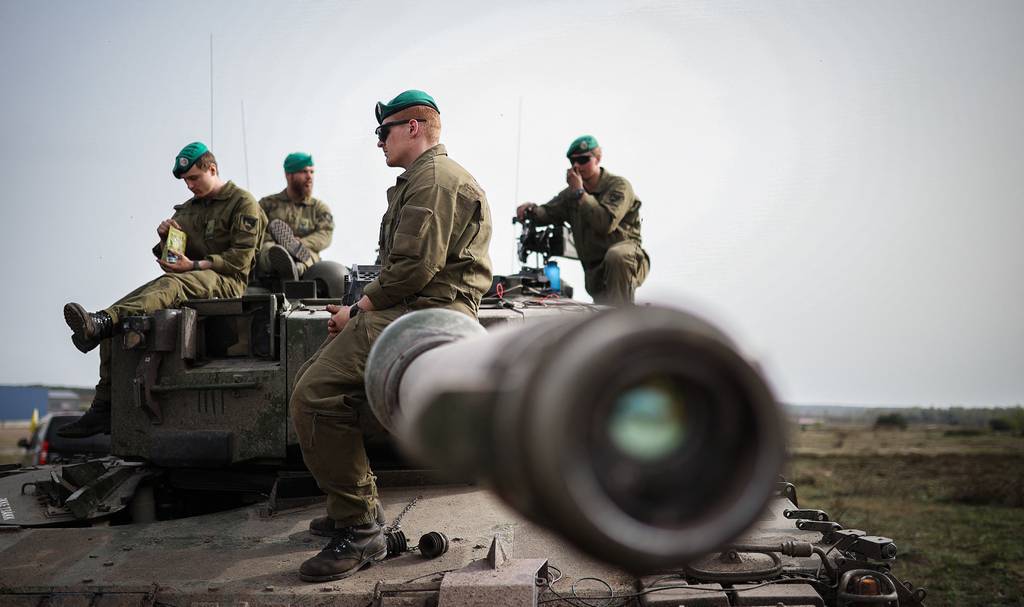
ROME — The team-up between KNDS and Leonardo last December to build tanks and fighting vehicles was touted as a key step towards well timed European defense industry integration as the continent faces war on its border and growing competition from overseas.
“The aim is to create a truly European Defense Group,” the firms said at the time.
The spectacular collapse of the deal this week was a sharp reminder that business is business and deals will never get far if CEOs believe they will not make money.
Bolstered by a government-to-government accord between Rome and Berlin, the December pledge between Franco-German consortium KNDS and Italian defense giant Leonardo envisaged potential collaboration on a new Italian five billion euro program to build fighting vehicles and the possible entry of Italy into a KNDS plan for a new European tank.
It also laid the groundwork for what could have been a keystone in industrial integration: a stake for Leonardo in KNDS, which is consortium of Germany’s Krauss-Maffei Wegmann and France’s Nexter.
But in the short term the deal to kick things off was a major, €8.2 billion ($8.8 billion) acquisition by Italy of 270 Leopard 2A8 tanks, a program agreed hurriedly by Italy last year to honor NATO commitments as tank warfare grabbed headlines in Ukraine.
As they planned an assembly line for the tanks in Italy, Leonardo managers also saw chances to add their own electro-optical sensor, software defined radio, command and control system and possibly the gun barrel, only for manufacturer KNDS to baulk at the idea that a tank they had sold in a very standard format to 18 customers should be customized.
In a sharply worded press release on Tuesday, KNDS said it “is no longer in talks with Leonardo regarding a potential partnership with the Italian company.”
According to German and Italian analysts, political goodwill and strategic visions for European synergies could not stand in the way of balance sheets.
“If it was a case of electronics and additional drones, there could have been a way to plug in Italian systems, but a gun may have been considered too much,” said Christian Mölling, the deputy director of the German Council on Foreign Relations’ Research Institute.
“It may have created extra costs and risks that KNDS did not want. Their production is full so they didn’t need to compromise. Talks won’t change industrial reality which is driven by the wallet and not by political visions,” he said.
Alessandro Marrone, who heads the defense program at Rome think tank IAI, said Italy had lacked leverage with KNDS because the Leopard purchase was undertaken in a hurry.
“Thanks to a growing demand for Leopard in Europe KNDS is in a stronger position than before. Italy had to decide and plan the replacement of its main battle tank years ago, but after the Russian invasion of Ukraine, the urgency to modernize Italian army’s heavy capabilities by replacing its obsolete Ariete tank reduced Rome’s leverage a partner,” he said.
The collapse of talks, he added, “tells us that it is difficult to find a solid agreement even where there are good reasons to do so and the chances of success are high. Defence cooperation and integration are the goals restated by European politicians over the last decade in many strategic documents, but the reality is more complicated.”
If Leonardo’s potential entry into KNDS as a stakeholder is now also less likely, Mölling said Italy’s participation in the KNDS-led Main Ground Combat System (MGCS) tank program could still go ahead.
“That is not off the table, firms can be competitors and partners,” he said.
Mölling said that in any case he still had doubts the MGCS program would get fully off the ground. “It may turn into an evolutionary program, a kind of laboratory to develop add-ons for the Leopard,” he said.
That however will not benefit Italy if it does not now buy the Leopard and instead opts for Rheinmetall’s prototype Panther.
Given that the Panther is still at the early stages of development, there may be room for the input of Italian systems if Rome signs up. But Mölling said cost would again be a factor.
“Can Rheinmetall match the 10-12 million euros cost of a Leopard?” he said.
Tom Kington is the Italy correspondent for Defense News.
- SEO Powered Content & PR Distribution. Get Amplified Today.
- PlatoData.Network Vertical Generative Ai. Empower Yourself. Access Here.
- PlatoAiStream. Web3 Intelligence. Knowledge Amplified. Access Here.
- PlatoESG. Carbon, CleanTech, Energy, Environment, Solar, Waste Management. Access Here.
- PlatoHealth. Biotech and Clinical Trials Intelligence. Access Here.
- Source: https://www.defensenews.com/global/europe/2024/06/14/german-italian-tank-kerfuffle-dings-vision-of-europeanized-arms/



